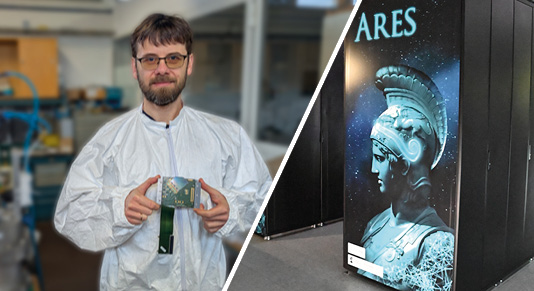Cyfronet supercomputers were used to conduct research, the results of which were published in the prestigious scientific journal Chemical Science.
Scientists from the Coordination Chemistry Team of the Faculty of Chemistry of the Jagiellonian University: Mariusz Radoń, PhD DSc (prof. of the Jagiellonian University), Gabriela Drabik, Maciej Hodorowicz, PhD DSc and prof. Janusz Szklarzewicz, have developed a new benchmark for the problem of spin state energetics in transition metal complexes. The research topic was highlighted in a press release from the Faculty of Chemistry.
An article describing the results, entitled “Performance of Quantum Chemistry Methods for Benchmark Set of Spin–State Energetics Derived from Experimental Data of 17 Transition Metal Complexes (SSE17)” was highlighted in the “Chem Sci Pick of the Week” section, which aims to promote articles selected by the Chemical Science editorial team.
The research was conducted using Cyfronet supercomputers made available via the PLGrid infrastructure. Therefore, we asked the lead author to specify to what extent supercomputers support the team’s research work.
- Supercomputers are essential for performing quantum-chemical calculations, which are an important research tool in chemistry today, especially bioinorganic and coordination chemistry. In the case of the research described in the publication we are discussing, Cyfronet supercomputers allowed us to perform most of the DFT calculations for molecular and crystal models, as well as some calculations using wave function-based methods. Thus, the PLGrid infrastructure significantly supports our research work. Not only the hardware provided is important here, but also the software (software licenses, e.g. Turbomole, Molpro, Gaussian) – informed prof. Radoń.
Asked how he assessed the functioning of the PLGrid infrastructure, the scientist replied:
- Basically, it is good, things are going in the right direction. In particular, I am pleased with the purchase of Ares nodes with larger than standard RAM (plgrid-bigmem), required for some types of calculations. The aforementioned availability of licenses for many quantum-chemical programs necessary in our research work is also important.
Prof. Radoń also spoke positively about the support provided by PLGrid specialists:
- I assess the functioning of the helpdesk and the recent changes in the PLGrid portal, e.g. the system for submitting, settling and renegotiating grants, well: in general, the amount of "bureaucracy" that a scientist has to do is at an acceptable, reasonably low level. I also have the impression that the response time (e.g. in connection with grant renegotiation) has shortened, which I assess positively.
At the same time, prof. Radoń pointed out that the team's research additionally requires specialist computers with a large amount of RAM (over 1 TB), which is not normally available even on supercomputers, and with built-in SSD drives. This shows that the needs of modern science are growing extremely quickly. The constantly expanding supercomputing infrastructure of ACC Cyfronet AGH is an attempt to respond to the ever-increasing demand of researchers for computing power, hardware accelerators and memory resources.
Congratulations to the entire team!



